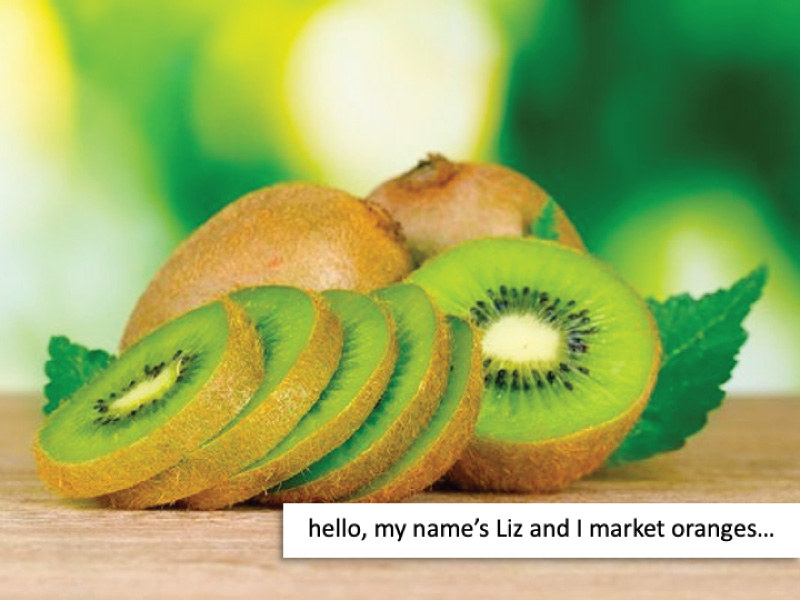So, what do Kiwifruit have to do with anything? At the end of the presentation, I’ll make like Q&A and throw it open to the audience to crowd source the answer. Extra gold stars if you use a hashtag.
If you haven’t guessed already, my name’s Liz and I’m very definitely Generation Y. Tonight I’m going to share with you the long list of the relatively fleeting jobs I’ve had (well, by Baby Boomers standards anyway – two years is a long time!) and what I’ve managed to accomplish up my ripe old age of 30. I’m also going to share with you about how up-starters like me are disrupting the way we do business and how we have to shake up the agricultural industry in order to transform from the mining boom to the dining boom.
To give a bit of context. I’m a Wongan Hills girl, did most of my schooling at our local school then spent five years at boarding school followed by three years for my undergraduate degree. Since then I’ve worked as a grain sampler, a butcher, a barista, a swine artificial inseminator, a biodiesel trainer, a wedding planner, a qualified citrus pruner, a tourism officer, a road show crew member, a regional development officer, a marketing manager and an ag research program manager. And that’s just what I’ve done for money.
All the stuff that I love doing, the stuff I volunteer for, has seen me walk the Thai Burma Railway Line with five WWII ex-POW’s, be a radio DJ at Princess Margaret.
Hospital, deliver meals on wheels, live and volunteer in Papua New Guinea for two years with AusAID, contribute to various community committees in Wongan Hills, be elected as the youngest ever President of Australian Women in Agriculture, form advisory groups to the WA Museum, the Murdoch Commission into food security and the UWA Centre for Regional Development, and represent Oceania on the World Farmers’ Organisation Women’s Committee.
In the past few years I have also been awarded the Women in Australian Agribusiness 100 Outstanding Emerging Leader Award, received a scholarship from Fairfax Agricultural Media to complete the Australian Rural Leadership Program and most recently won the 2016 WA Young Achiever of the Year award.
I’m currently coordinating a $26 million agricultural research program in Papua New Guinea for the Australian Centre for International Agricultural Research and I also manage the marketing for WA’s largest citrus producer Moora Citrus which just so happens to be our family business.
And tonight, I’m starting at Kiwi fruit. Which makes total sense for a citrus producer, right?

Why is it that the worlds largest taxi company, owns no vehicles? Uber.
The most popular media owner, creates no content? Facebook
The world’s most valuable retailer, owns no inventory. Alibaba.
And why the largest accommodation provider, owns no real estate? Airbnb.

The way businesses are being structured, brands established and revenue streams created has changed. Their value lies not in their physical assets; but in their utility, their understanding of changing needs and values of consumers, and importantly, their branding.
If you were investing in a business in this disruptive age, knowing consumers care as much about the why of your brand, just as much as your actual product, would you first invest in your factory, or your brand? Right now, this is an immensely important question for Australian agriculture, with a supply chain in an absolute flux, primarily due to the all-persuasive power of digital, enabling consumer power.
Structural transformation is also having a major impact in the form of significant foreign investment in farmland and food, the opening up of trade barriers in China and beyond, and the demise of statutory marketing bodies. Manufacturers once ruled what consumers would buy – today consumers are in control. Traditional food processors, traders and retail channels are left wondering about their next move. McDonalds Senior Executive Gary Johnson spoke recently at Beef 2015, and reinforced the importance of quality and how its definition has shifted.
"Our decades old definition of quality no longer has merit. In a world awash with competition, people don’t buy from brands that don’t align with their values”
Gary Johnson
Speaking about the Australian agriculture industry’s neglect on ‘sustainable beef’ positioning, Mr Johnson noted the trend on values being reinforced by the digital revolution, allowing consumers to quickly spread stories, positive or negative.
“McDonald’s wants to tell a good story – but it needs Australian Beef to tell it first. The more stories about the good we’re doing, the more customers want to align with our brand”.
For monolithic brands like McDonalds, who’ve built their brand on convenience and consistency, it’s a tough ask. Recognising they need to remain agile and respond to their individual consumers unique appetite, McDonalds did something only a well-established brand can do – they contradicted themselves.
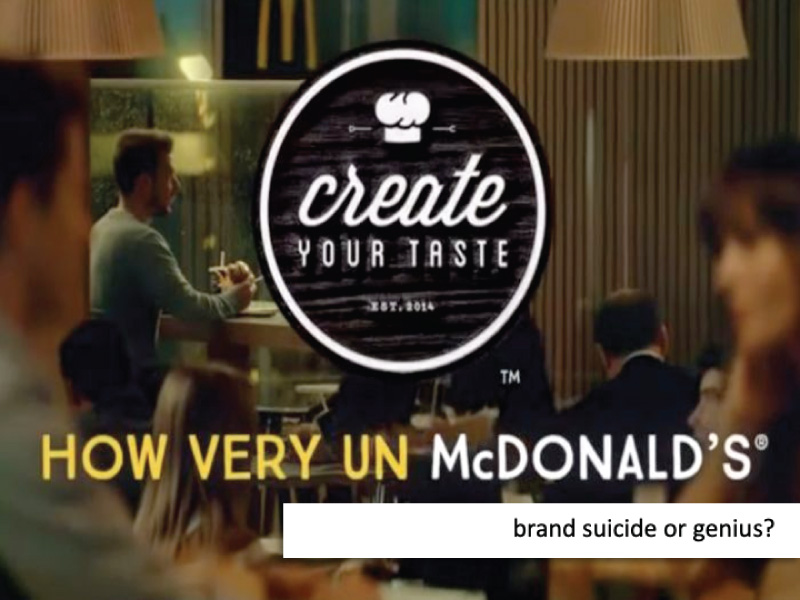
To the critical eye, it’s a very bold move for McDonalds to distance themselves from, well, themselves. But really it’s a very clever way to engage consumers, outsource market research in a way, to build their own bespoke burgers in an attempt to cash in on the rise of the foodie culture. McDonalds recognised that their old stagnant brand wasn’t responding to what their consumers valued.
And I don’t blame them. Did you know that 50% of my generation, Generation Y, count themselves as foodies? Have you seen how many people post photos of their food these days? I mean I do, but I have an excuse – I grow food! But what are you doing to engage these self-professed food critics?
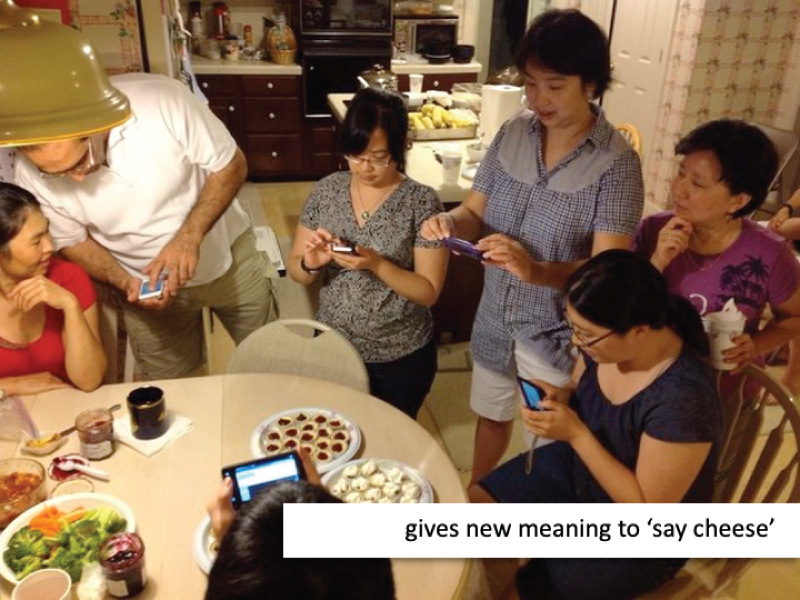
So, what does this new wave of disruption, of consumer-centric thinking, this new ‘thankyou economy’ mean for business? Let alone businesses in the Northern Valleys region?
Well, unlike many businesses or regions who don’t realise the power of identifying and embracing their brand, Northern Valleys Agribusiness has catalysed unprecedented discussions about what’s possible when otherwise unrelated businesses collaborate to create something bigger than themselves.
Working in a fledgling family business, I fully understand the limitations of limited resources, namely finance and time, to invest in branding and marketing. This is exactly why we need to work together.
“If you want to go fast, go alone. If you want to go far, you need a team.”
Just like McDonalds is engaging with the Australian beef industry to tell their story, connecting with consumers through shared values, we need to engage with like-minded businesses to share our story, the why behind our brand. And Northern Valleys Agribusiness is in a unique position to do so.
To demonstrate what I mean, I’ve collated a series of examples of where businesses have collaborated to cross-promote and share each other’s stories.
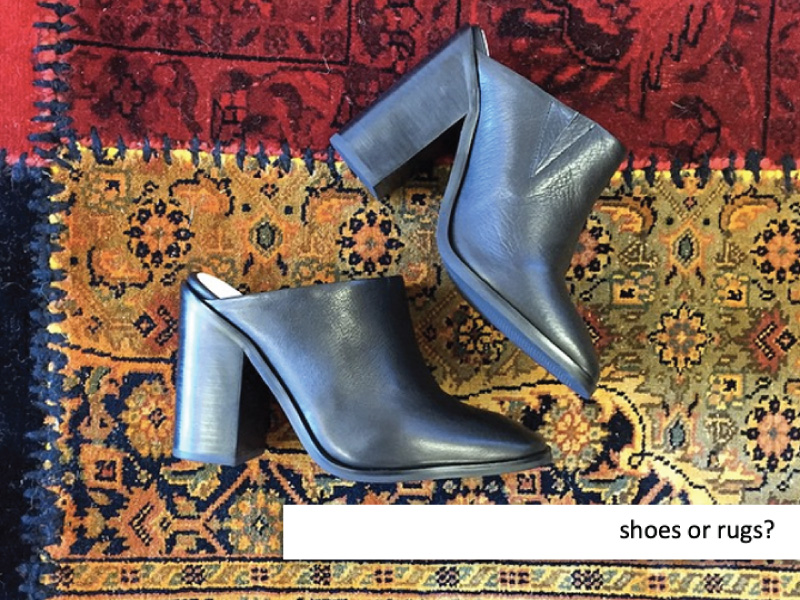
But why is this cross-promotion so important?
Now, I might be generalising her a little, but I suspect we have a few Traditionalists (1925-1945), Baby Boomers (1946-1964) and Generation X-ers (1965-1979) in the room tonight? This being the case, my guess is that your preferred method for obtaining information is from a well-cited, reputable source. Which is excellent. But as we move further and further into this century, we are seeing a huge surge of Generation Y (me) and Generation Z (1996 – now) or digital natives coming into the workforce, who by 2020 will make up 31% and 20%, respectively – that’s over half! And whilst we think it’s really vintage and hipster to use an encyclopaedia, we’re actually pretty ok with buying something if Jamie Oliver or Beyoncé say so. As long as someone we trust said something’s good, we’re happy to like it, retweet it, Instagram it, purchase it and even talk about it in a presentation!
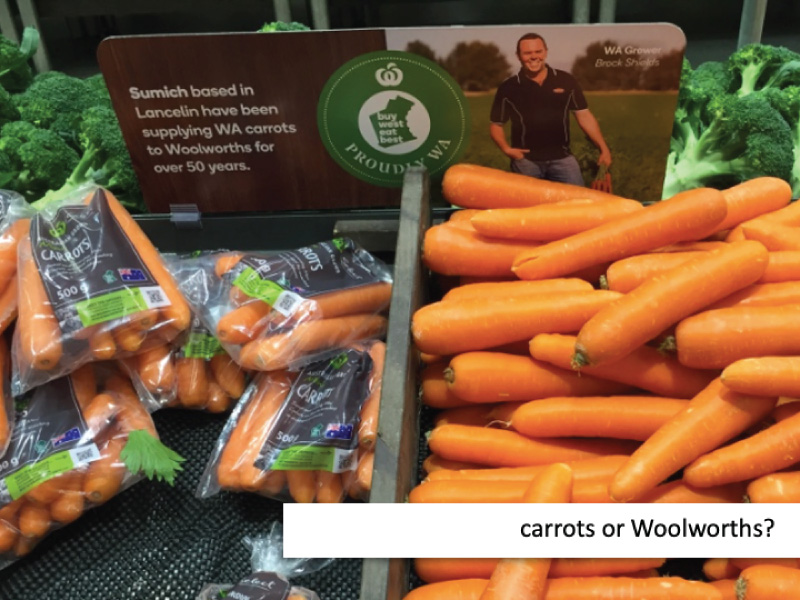
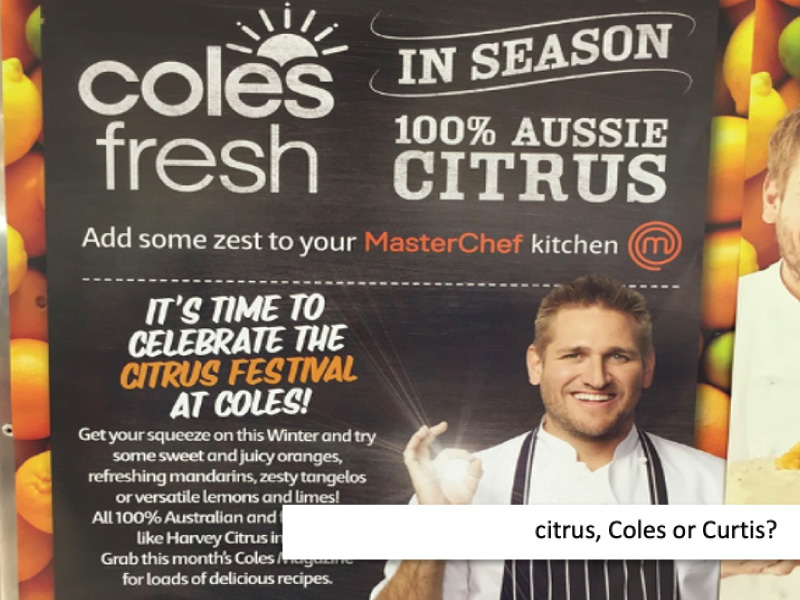
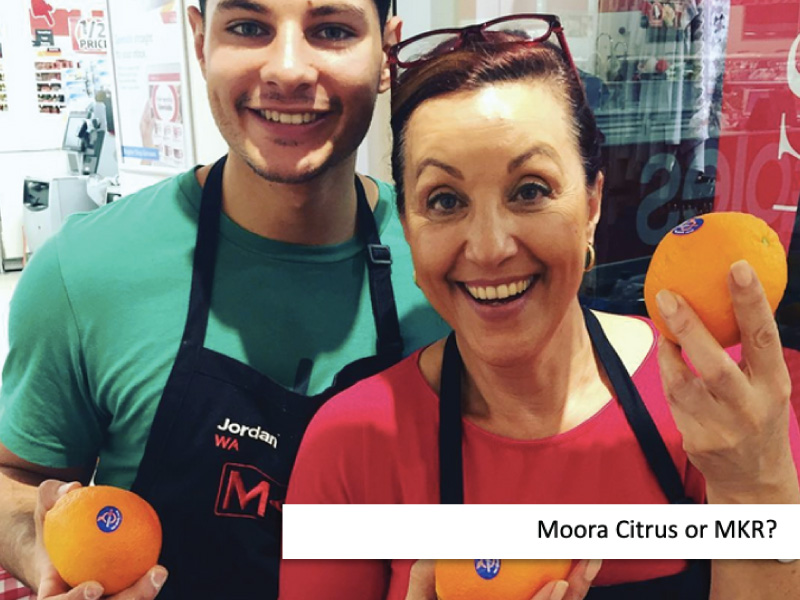
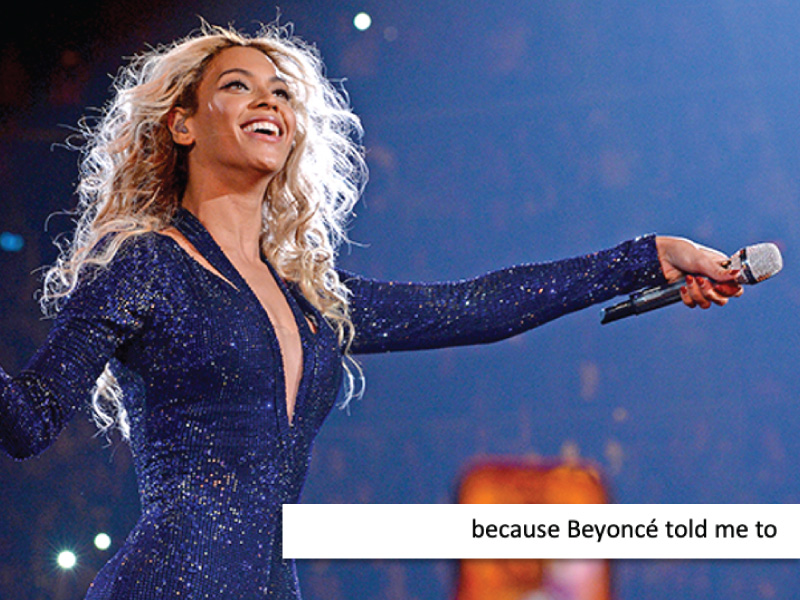
Your brand is not what you think it is, it is everything your customer says it is.
So, if your brand is just as good as she says it is, and if we’re clever enough to get Jamie Oliver to say it’s pretty good – in fact, didn’t Prince Harry once say he thought a Parisian Brest from the Bindoon Bakehaus was pretty darn special? – either way, you get my point.
The impetus of Northern Valleys Agribusiness is not just about agribusiness. It’s about each of us do what we do well and building each other’s brand by collaborating and cross-promoting. We need to engage with our consumers and by doing so, align our businesses with the values of our consumers.
I don’t want to be the flailing taxi industry up against Uber, or the print newspapers going out of business trying to compete against the Facebook’s of the world, I don’t want to be the empty retail shells battling online retailers like Alibaba or eBay, I don’t want to be the ubiquitous hotel chains struggling to fill beds when Airbnb offers personalised service like home.
I want to be a part of business, be a part of region, that realises it’s potential in the dining boom.
So, how we do that?
Collaboration, collaboration, collaboration – between businesses, between brands, and dare I say it, between generations. Us Gen Y-ers have a lot to learn from the dedicated workaholic Baby Boomers, and vice versa. Similarly between businesses. And with the Northern Valleys Agribusiness leading the region in catalysing unprecedented discussions about what’s possible when otherwise unrelated businesses collaborate to create something bigger than themselves, we’re already disrupting the state of play.
Let’s keep disrupting our old ways of thinking, our old way of doing business. Because if we don’t, we will be overcome by the Ubers, Facebooks, Alibabas, eBays or Airbnbs of the world.
And I’ll ask you again, what do Kiwifruit have to do with anything?
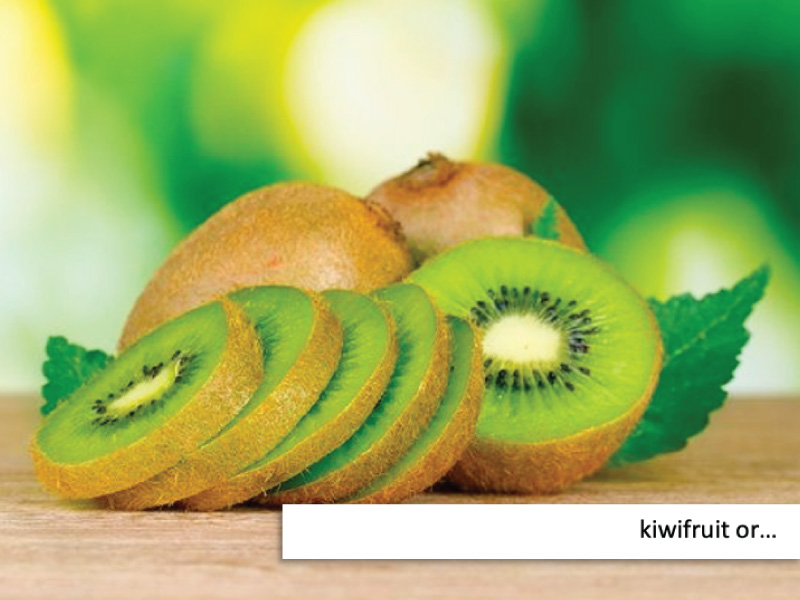
Kiwifruit are not even from New Zealand. They’re actually native to China. But years after cultivating them in Kiwi land, in 1962, farmers began calling it kiwifruit to give it more market appeal and were then able to tap into the vast American market. The rest is history. And that is the power of brand and disrupting our old ways of thinking.

